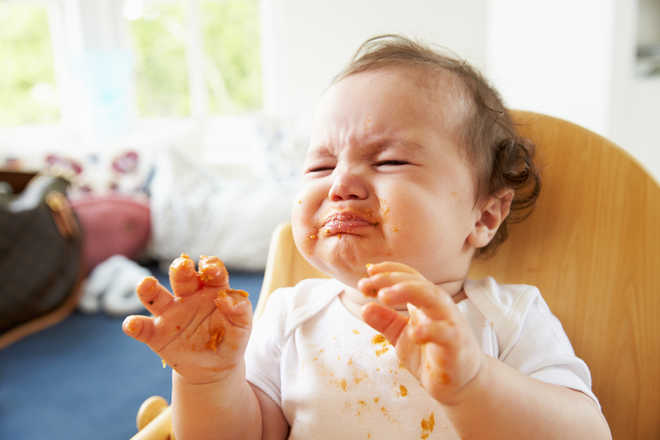
Photo source: Thinkstock
New York, August 23
Babies that seem to get upset more easily and take longer to calm down may be at higher risk for obesity, according to a new study which suggests that parents should reward their infants with activities such as a trip to the playground instead of food.
The study also found that babies that exhibit more "cuddliness" and calm down easily are less likely at the risk of obesity.
"The research tells us that differences in behaviour begin as early as infancy and those differences can influence health behaviours that impact future health risks," said Kai Ling Kong from University of Buffalo in the US.
For the study, 105 infants from nine to 18 months old were taught to press a button to earn a reward.
They completed the task twice, and received either a piece of their favourite food as a reward or ten seconds of a non-food reward, such as blowing bubbles, watching a Baby Einstein DVD or hearing music.
Parents were instructed to say only specific phrases while the child completed the task.
As the task went on, it became increasingly difficult for the infant to earn the reward as they had to press the button more times.
The amount of "work" they were willing to do was calculated by counting the number of times the child was willing to press the button to get the reward.
The child's temperament was assessed through a detailed, 191-question online questionnaire that parents completed.
"We found that infants that rated higher on what we call cuddliness - the baby's expression of enjoyment and molding of the body to being held - had lower food reinforcement," said Kong.
"That means they were willing to work more for a non-food reward versus a food reward. So an infant who enjoyed being held closely by a caregiver was less motivated to work for food," she said.
Researchers measured cuddliness by asking parents specific questions such as, "when being held, how often did your baby pull away or kick?" and "while being fed on your lap, how often did your baby snuggle even after they were done?"
Infants who rated high on how quickly they could recover from crying or being distressed also were less motivated to work for food compared to non-food alternatives.
"Using rewards other than food, such as a trip to the playground or engaging in active play with their parents, may help reduce the child's tendency to find pleasure in food," said Kong.
"Making available a wide array of toys, activities and playmates so food is not the main focus and sole source of pleasure also can be beneficial," she added.
The findings were published in the journal Childhood Obesity. — PTI



























